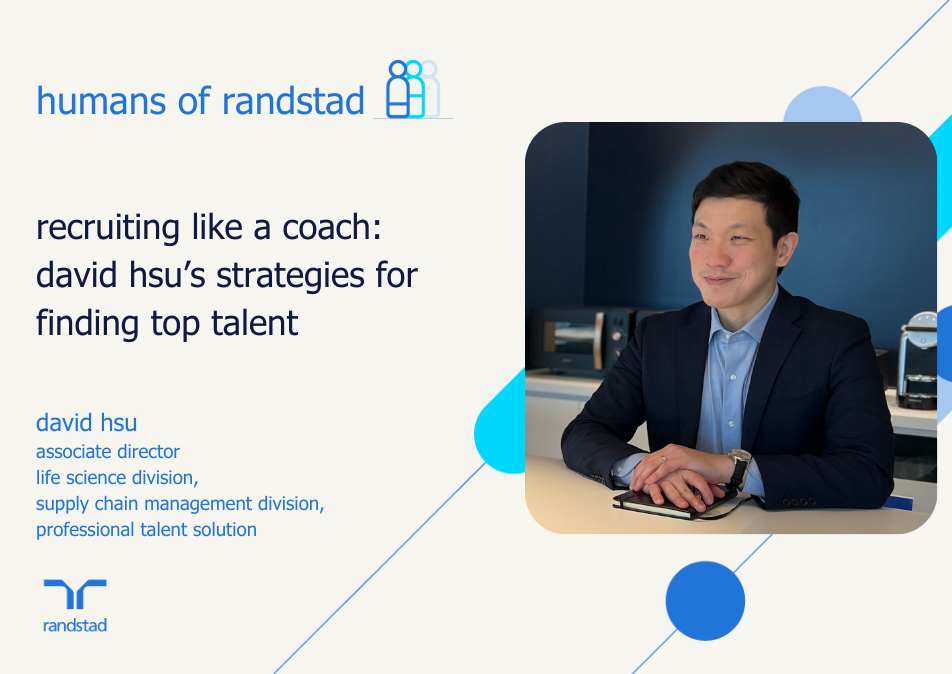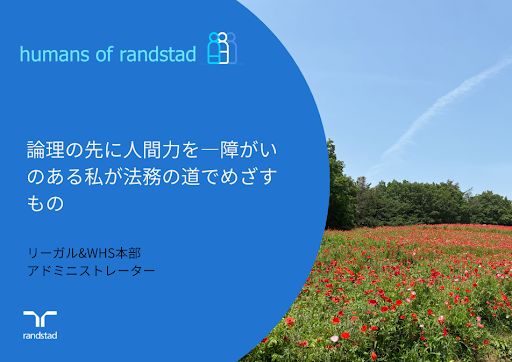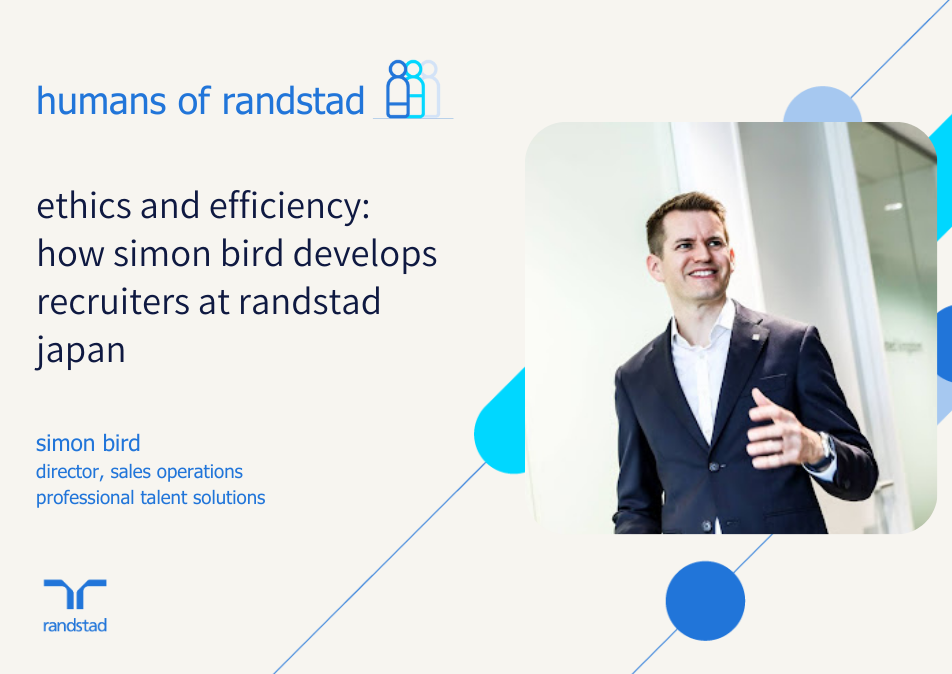interviewRecruiting like a coach: David Hsu's strategies for finding top talent

David HsuAssociate Director
Life Science Division
Supply Chain Management Division
- profile
- Born in Taiwan, I lived and attended pre-school in Nagasaki Japan before immigrating to the United States. I grew up in Chicago and I am a proud Chicagoan and Chicago Bulls fan. After University, I worked for the Japanese government as well as a global Japanese Freightforwarder before joining then Wall Street Associates (Now en world) on the Supply Chain and Procurement team. There I found my deep interest and passion in recruitment and after 10 years there I joined Randstad Professionals.
From Taoyuan to Nagasaki to Chicago to Tokyo

David Hsu has an interesting connection to Japan.
Born in Taoyuan, Taiwan to parents who are both dental technicians, David lived in Nagasaki for two years and attended kindergarten there, in the castle town of Omura.
At the age of seven he ended up in Chicago, where his father had the opportunity to work in a lab, and David arrived in the U.S. not being able to speak a word of English.
“I remember that day really clearly because I saw the first squirrel in my life,” he says.
He also had pizza and hamburgers for the first time.
David’s grandparents took care of him as a baby so he grew up speaking Taiwanese, which quickly turned into Nagasaki-ben (dialect). He switched to Mandarin when he went back to Taiwan for a year for his last year of preschool in preparation for his move to the U.S.
He didn’t start learning English until he was seven, but now it is his native language.
“My Japanese is probably more proficient than my Chinese just because I've been working here for such a long time. And my worst language is my first language, which is Taiwanese,” he says.
In total, David has been in Japan for 16 years.
Even before he came to Japan in 2009, he studied at Chiba University as an exchange student.
His move to Japan wasn’t exactly planned. When he came on the JET program and was working for the Japanese government as a coordinator for international relations, he was thinking about a career in law and preparing for the LSATs.
Because his LSAT scores weren’t very good and he was open to different ideas, David decided to join Wall Street Associates (now en world Japan). He was 26 when he entered the recruitment industry.
Ways to succeed as a recruiter

David thinks there are two types of people who find success in recruitment.
“One type is the type that hits their head against the wall over and over again and finally they find success. The other type is the one who is blessed by their environment and has amazing leaders and mentors around you that teach you and show you the way. I was one of those,” he says.
“I was taught by some of the best recruiters that have ever worked in Tokyo. I was very, very lucky.”
When David decided it was time for change after 10 years with Wall Street Associates, he made a list of every single company with a team in the area that he specialized in — supply chain and procurement — and set up meetings with a lot of those people. He explains why he picked Randstad.
“It’s very difficult to find a recruitment company with a good culture. Randstad has that, and it allows people freedom to work and truly master the space that they recruit for. Very few companies are able to prioritize teamwork over self gain. That’s one attractive part about Randstad,” David says.
David says the title “associate director” is a bit misleading because his role is fluid, even though the general expectation of an AD is to be both player, who can show that he is capable of billing, and manager.
David thinks he was able to become an established person in the market because he isn’t your typical salesperson.
“One: I’m a bit more introverted. Two: one thing I’ve always enjoyed is teaching and coaching. I’ve been a summer camp counselor and a basketball coach. I decided to postpone my work in education and first try to be successful in the business world. When I talk to candidates and clients I’m thinking about what sort of value I can bring.”
He has done a lot more than matching resumes with job descriptions. For example, he has organized network events for top supply chain managers across different industries and set up mentors for future leader types, going above and beyond for job seekers and job givers and helping both sides see the best in the other.
A great recruiter like David recognizes the dual role: that they are not merely hiring employees but are facilitating a match that should benefit both the candidate and the company.
Always a learner

David says for most recruiters, it’s about job matching and making placements.
But for David, who has been a recruiter for 15 years, the most rewarding part about the job is career consultation.
“I would say that’s 50% of my job. How I recruit, how I educate and coach my staff, I think that’s what I’ve always enjoyed and what keeps me going,” he says.
“If you’re going to be a good recruiter, then learning never stops,” David says.
One candidate in particular has left an impression on him. He helped this 30-year-old woman develop new skills and move from a 4.5 million yen haken (temporary) job to a full-time position that earned her 7.5 million yen within a span of four years. Fast forward another four years, David introduced her to a job which pays her 11 million yen.
“I didn’t think in my life I would ever experience this kind of thing. She didn’t come from a privileged household. It comes down to skills. Most people don’t have a strategy and agents aren’t typically thinking about mid- to long-term careers, so that’s just one example of someone’s career being impacted by my introduction.”
Meanwhile, David says the hardest part about his job is gaining wisdom. Seeing the big picture and being genuinely curious about the candidate’s skill set and personality, the company’s systems and its maturity level — all these factors could influence a successful change.
“If you do this job for a long time, I always think of myself a little bit like a Google algorithm. At this point I’ve met 10,000 candidates so I’ve seen over 10,000 CVs. Let’s say we were to take the food industry, Danon, Mars, Seiyu, whatever it is. I try to understand every single organization and who’s in the organization by name. That takes time.”
With three children — all under the age of 7 — David has had to rethink how he works. He often works from home and feels blessed that Randstadt allows him the freedom to do so as long as he delivers. He spends quality time with his kids when they get back from school up until bedtime, then gets back to work.
He has spent the last few years building a sustainable team with a good culture, and he says it also helps that his team members do not need him to be constantly telling them what to do.
“Once that happens, it frees up a lot of time,” he says.
He is also involved in hiring and when he interviews young, inexperienced recruiters, he looks for consistency in their thought process. He likes to ask questions about people’s decision making at life’s crossroads because it says a lot about how serious and forward-thinking that person is.
An avid basketball fan, David finds the time to shoot basketball, do yoga and play the violin with what little time he has left when he’s not balancing fatherhood and work. He also loves history and geopolitics.
“Sports teaches you confidence and, in some cases, leadership. If you’re physically healthy you’re that much more effective. Basketball helps me a lot,” he says.
Why supply chains & Healthcare (Life Science) matter

According to David, despite all the global challenges, this is one of the best times for any human to exist on this planet.
Why does he think that?
“Supply chain & advances in healthcare. It’s because P&G makes diapers in Kansai, Danon makes yogurt in Gunma, advanced medicine, medical devices and different treatments are being produced, Amazon delivers your products during COVID, we have computers that allow us to meet online, all these different things,” he says.
“Supply chain and advances in healthcare is what keeps society going. It’s what keeps our status of living stable.”
David is proud of doing something that affects people’s lives positively and contributing to Japan by specializing in supply chain-related and healthcare roles.
“I find the area that I recruit for very, very meaningful,” he says. “The way to contribute to Japan is to maximize output and help people find better ways to optimize their skills and that way optimize the country.”





